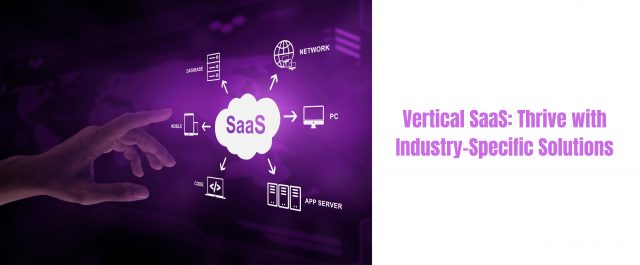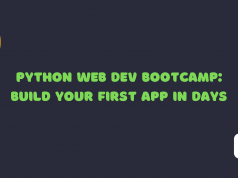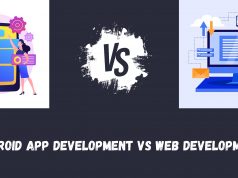In today’s dynamic and ever-evolving business landscape, the demand for specialized software solutions is at an all-time high. Businesses across various industries are seeking tailored tools that cater to their unique needs and challenges. Enter the realm of vertical SaaS (Software as a Service) web apps, designed to address the specific requirements and workflows of a particular industry.
Unlike horizontal SaaS solutions, which offer generalized features applicable to a broad range of industries, vertical SaaS apps delve deep into the nuances of a specific domain. They are meticulously crafted to address the pain points, operational complexities, and regulatory requirements unique to that industry.
Vertical SaaS: Key Stats and Insights
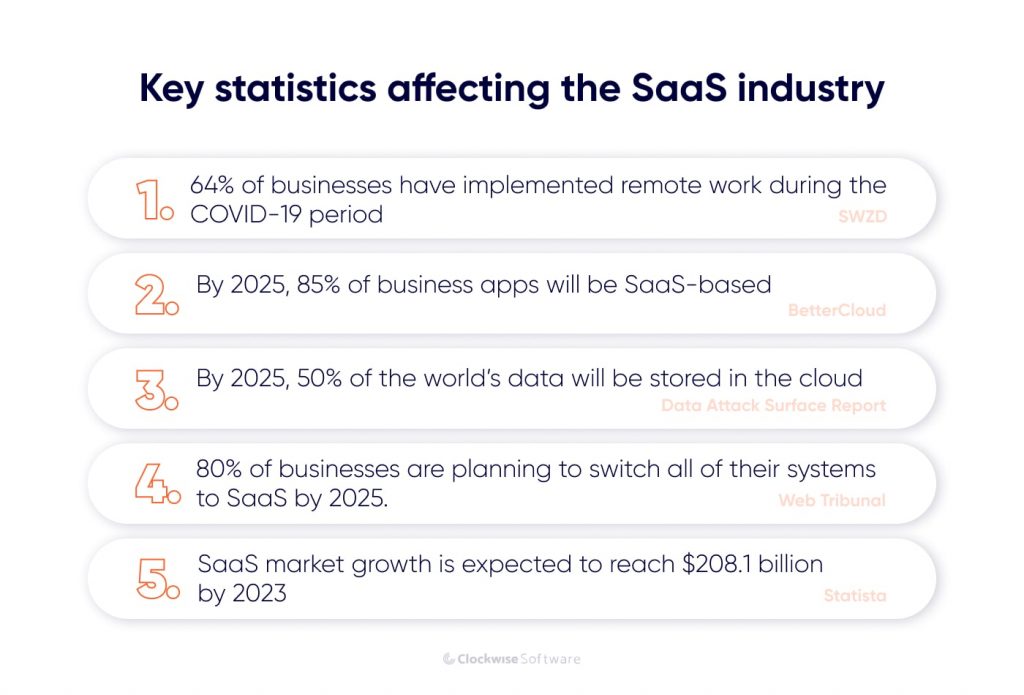
Source: Clockwise
- The global vertical SaaS market is expected to reach $18.3 billion by 2028.
- Vertical SaaS applications are growing at a CAGR of 13.3%.
- 86% of businesses believe that vertical SaaS applications are important for achieving their business goals.
- 54% of companies choose vertical SaaS tools to increase productivity.
- 73% of businesses are planning to make all their systems SaaS by 2025.
Vertical SaaS vs. Horizontal SaaS:
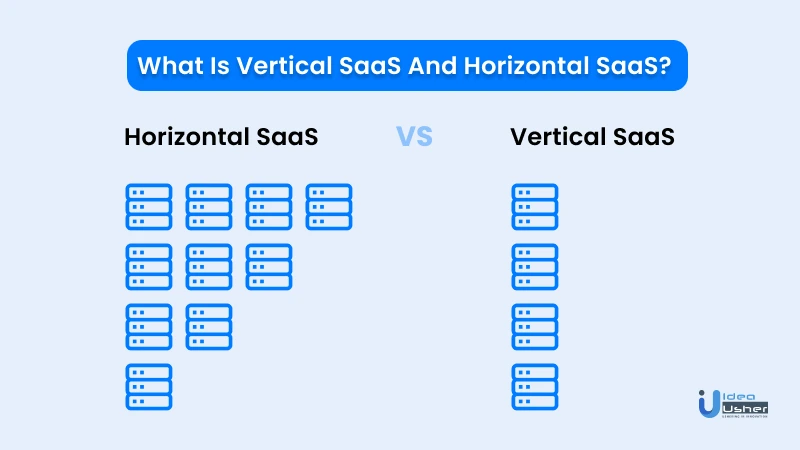
Source: IdeaUsher
Vertical SaaS: Industry-Specific Solutions
Vertical SaaS, as the name suggests, caters to the specific needs and challenges of a particular industry. It delves deep into the nuances of a sector, providing tailored features, functionalities, and compliance support that align with the unique regulatory requirements and workflows of that industry.
Horizontal SaaS: Generalized Solutions for a Broad Range of Businesses
Horizontal SaaS, on the other hand, offers generalized tools and functionalities applicable to a wide range of businesses, regardless of their industry affiliation. It provides solutions for common business processes, such as customer relationship management, project management, and communication.
| Feature | Vertical SaaS | Horizontal SaaS |
| Industry Fit | Tailored to specific industries | Applicable to a broad range of industries |
| Feature Depth and Specificity | Offers in-depth features tailored to industry-specific workflows | Provides generalized features that can be applied across various industries |
| Compliance Adherence | Designed to meet industry-specific compliance standards | May not address industry-specific compliance requirements |
| Scalability and Adaptability | Scalable to accommodate the growth and evolving needs of businesses in a specific industry | Scalable for a broad range of businesses, but may require customization for industry-specific needs |
| Integration | Designed to integrate seamlessly with existing enterprise systems within a specific industry | May require additional integration efforts to fit into the unique software landscape of different industries |
| Cost | May incur higher upfront costs due to the specialized nature of the solution | May offer more affordable upfront costs due to the generalized nature of the solution |
| Customer Support | May offer more affordable upfront costs due to the generalized nature of the solution | Offers general customer support that may not have in-depth knowledge of specific industry requirements |
| Competitive Advantage | Empowers businesses with industry-specific insights and best practices | Provides common tools and functionalities that can enhance operational efficiency but may not directly contribute to a competitive advantage |
Vertical SaaS: Understanding the Key Differentiators
Industry Specificity:
Vertical SaaS solutions are designed to address the specific needs and challenges of a particular industry. This entails incorporating features and functionality customized to the industry’s unique workflows and regulatory requirements.
Compliance Adherence:
Vertical SaaS providers are acutely aware of the industry-specific regulations and compliance standards that their customers must adhere to. As a result, their solutions are designed to meet these requirements out of the box, helping businesses avoid costly fines and penalties.
Deep Industry Expertise:
Vertical SaaS providers have a deep understanding of the industries they serve. This expertise allows them to develop solutions that are not only functional but also strategic, helping businesses gain a competitive edge.
Scalability and Adaptability:
Vertical SaaS solutions are designed to scale with the evolving needs of businesses. This means that they can accommodate growth and adapt to changing industry trends and requirements.
Seamless Integration:
Vertical SaaS solutions are often designed to integrate seamlessly with existing enterprise systems. This minimizes disruptions and maximizes the value of existing software investments.Cost-Effectiveness:
Vertical SaaS eliminates the need for costly on-premise software installations and maintenance. Instead, it offers a subscription-based model that aligns expenses with usage and business growth.
Benefits of Vertical SaaS Web Apps
Enhanced Efficiency and Productivity
Vertical SaaS web apps are designed to address the specific workflows and operational needs of a particular industry. This tailored approach eliminates redundancies and automates repetitive tasks, freeing up valuable resources and enabling employees to focus on higher-value activities. By streamlining processes and reducing manual effort, vertical SaaS web apps significantly enhance productivity and overall efficiency.
Industry-Specific Compliance
Operating within a regulated industry can be a complex undertaking, with intricate compliance requirements and evolving regulatory standards. Vertical SaaS web apps are developed with a deep understanding of industry-specific regulations and compliance mandates. This built-in compliance ensures that businesses operate within legal frameworks, mitigating risks, fostering trust among stakeholders, and avoiding costly penalties.
Deeper Industry Insights
Vertical SaaS providers possess a wealth of industry knowledge and expertise, gained through years of experience and collaboration with industry leaders. This deep understanding translates into valuable insights and best practices embedded into vertical SaaS solutions. Businesses gain access to these insights, enabling them to make informed decisions, optimize their operations, and stay ahead of industry trends.
Scalability and Adaptability
As businesses grow and evolve, their software needs must adapt accordingly. Designers create vertical SaaS web apps to scale effortlessly, adapting to growing data volumes, expanding user bases, and evolving industry needs. This adaptability ensures that businesses are not constrained by their software infrastructure, allowing them to focus on growth and innovation.
Seamless Integration
Vertical SaaS web apps are designed to integrate seamlessly with existing enterprise systems, minimizing disruptions and maximizing the value of existing software investments. This integration ensures that data flows smoothly between systems, eliminating the need for manual data entry and reducing the risk of errors.
Cost-Effectiveness
Vertical SaaS web apps offer a subscription-based pricing model, aligning expenses with usage and business growth. This eliminates the need for costly on-premise software installations and maintenance, reducing upfront capital expenditures and ongoing IT overhead.
Improved Customer Experience
Vertical SaaS web apps empower businesses to deliver exceptional customer experiences. Industry-specific features streamline interactions, personalize customer engagement, and enable prompt resolution of issues. This enhanced customer experience fosters loyalty and drives business growth.
Competitive Advantage
Vertical SaaS web apps provide businesses with access to industry-leading technology, best practices, and specialized insights. This competitive edge enables businesses to differentiate themselves in the market, attract new customers, and achieve their strategic goals.
Case studies
Case Study 1: Healthcare
Company: Mayo Clinic
Challenge: Mayo Clinic, a world-renowned healthcare institution, was facing challenges in managing its vast patient records efficiently. The existing system was fragmented and prone to errors, leading to delays in care and potential misdiagnoses.
Solution: Mayo Clinic implemented Epic Systems’ EHR solution, a comprehensive vertical SaaS platform designed specifically for healthcare organizations.
Results:
- 20% reduction in medical errors
- 15% increase in patient satisfaction rates
- Improved patient care coordination
- Streamlined medical billing and reimbursement
- Enhanced data-driven decision-making
Case Study 2: Real Estate
Company: PropertyShark
Challenge: PropertyShark, a leading real estate data and analytics provider, needed a robust property management software solution to handle its growing portfolio of listings and client interactions.
Solution: PropertyShark implemented RealPage’s property management software, a vertical SaaS solution designed to streamline operations and enhance tenant experiences for property management companies.
Results:
- 30% increase in tenant retention rates
- 25% reduction in maintenance costs
- Streamlined tenant management and communication
- Automated rent collection and payment processing
- Enhanced customer relationship management (CRM)
Case Study 3: Law
Company: Dentons
Challenge: Dentons, the world’s largest law firm, sought a centralized case management software solution to improve collaboration and streamline legal processes across its global network of offices.
Solution: Dentons implemented Thomson Reuters’ CaseMap solution, a vertical SaaS platform designed to manage complex legal cases and provide lawyers with access to relevant information and insights.
Results:
- 10% increase in case win rates
- 15% reduction in billable hours
- Improved case outcomes
- Increased lawyer productivity
- Enhanced collaboration among lawyers and paralegals
Case Study 4: Retail
Company: Macy’s
Challenge: Macy’s, the iconic American department store chain, aimed to optimize its inventory management and enhance customer engagement through a unified retail management platform.
Solution: Macy’s implemented Oracle Retail’s RMS solution, a vertical SaaS platform designed to streamline inventory management, improve omnichannel customer experiences, and provide data-driven insights for retail operations.
Results:
- 5% increase in sales
- 2% reduction in inventory shrinkage
- Streamlined inventory management and ordering
- Enhanced customer relationship management (CRM)
- Improved omnichannel customer experiences
Case Study 5:Manufacturing
Company: Siemens
Challenge: Siemens, a global leader in technology and manufacturing, sought a comprehensive MES solution to monitor and optimize its production processes in real-time.
Solution: Siemens implemented Siemens Manufacturing Operations Management (SIMATIC MOM), a vertical SaaS platform designed to provide real-time production visibility, enhance quality control, and optimize manufacturing operations.
Results:
- 10% increase in production output
- 5% reduction in product defects
- Real-time production monitoring and optimization
- Improved quality control and defect detection
- Reduced downtime
These case studies demonstrate the transformative impact that vertical SaaS solutions can have on businesses across various industries.
Summary Highlights
In today’s dynamic business landscape, organizations are constantly seeking ways to optimize operations, enhance efficiency, and gain a competitive edge. Vertical SaaS has emerged as a powerful solution for businesses across various industries, providing tailored solutions that address specific industry needs and challenges. With its deep industry expertise and cutting-edge technology, GeekyAnts is at the forefront of developing innovative vertical SaaS solutions that empower businesses to achieve their strategic goals.
GeekyAnts solutions are designed to address the unique challenges and requirements of each industry, providing businesses with the tools and insights they need to streamline processes, improve decision-making, and achieve operational excellence. By leveraging GeekyAnts’ expertise, businesses can gain a competitive advantage and thrive in an increasingly competitive marketplace.
Avail their services here.





